Radiation Therapy for Breast Cancer
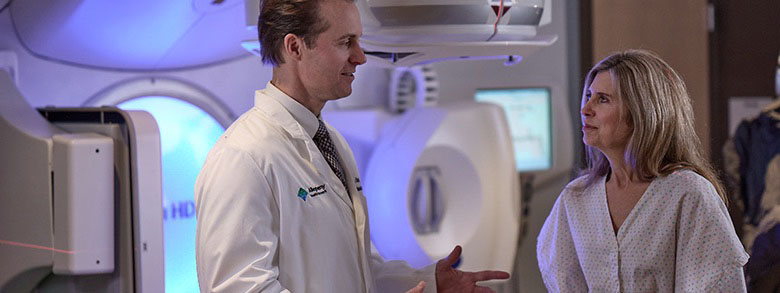
What is radiation therapy for breast cancer?
Radiation therapy for breast cancer is a treatment that needs careful planning and preparation by a team of specialists. Their goal is to kill breast cancer cells and prevent the side effects of radiation by keeping the healthy tissues and organs close to your breast safe. The team uses a machine called a linear accelerator that produces radiation. The radiation is delivered toward your tumor as precisely targeted, high-energy beams. The number of treatments you need depends on your specific type of breast cancer.
As part of the Breast Cancer Center of Excellence, our radiation oncology department provides personalized treatment plans. We use the latest technology to accurately target cancer while making sure the radiation doesn’t harm other parts of your body, like your lungs, heart, or nearby organs. Radiation therapy is often combined with other treatments, such as surgery or chemotherapy.
Innovative radiation treatment technology
Our Radiation Oncology Residency Program is based at Allegheny General Hospital and is part of the AHN Cancer Institute. Radiation treatments for breast cancer use the latest technology available to help provide you with effective treatments. We offer different types of radiation therapy for breast cancer, including partial or whole breast radiation and other therapies.
Experts in radiation treatment for breast cancer
The AHN Cancer Institute is one of the most experienced health care networks in treating breast cancer with radiation therapy. The radiation oncology staff includes board-certified radiation oncologists who participate in national and international research to help provide you with the most recent treatments available. We also offer two residency programs:
- Medical Physics Residency – Therapeutic Radiological Physics. This accredited program prepares new medical physics residents for a career in radiation oncology physics. The hands-on training helps residents become a competent, integral part of the radiology care team.
- Radiation Oncology Residency Program. Residents are trained on the full spectrum of radiation treatments for breast cancer and have experience in laboratory and clinical research. This program creates well-trained and compassionate radiation teams.
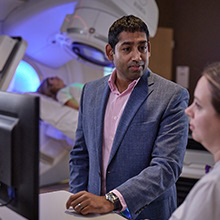
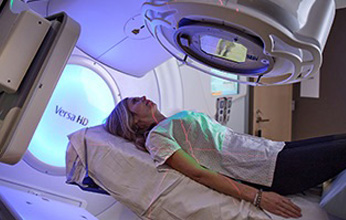
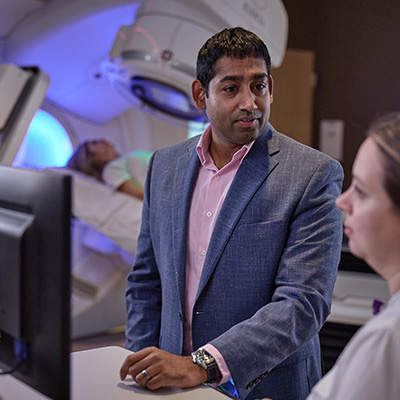

Radiation treatments for breast cancer
Radiation therapy for breast cancer uses targeted radiation beams to shrink and destroy cancer cells in the breast, lymph nodes, or both. Different types of breast cancer radiation therapies are available, including external and internal radiation therapy. We can use radiation therapy alone, or we may use it after surgery to kill any remaining cancer cells. We can also use it to treat symptoms caused by advanced cancer. Radiation therapy after breast cancer surgery typically takes place three to four weeks after you’ve healed.
External beam radiation therapy
External radiation therapy for breast cancer uses a beam outside the body to target radiation beams directly at the area where the cancer is or was located before surgery. This method allows the radiation to target the tumor while keeping surrounding parts of the body safe.
- Whole breast radiation therapy uses targeted beams of energy to shrink and destroy cancer cells following tumor removal. Many studies show that this treatment, in combination with a lumpectomy, is as effective as a mastectomy for patients with small or moderate-sized tumors. New techniques allow us to treat patients who meet the criteria in one to four weeks. Traditional breast cancer radiation treatments may take up to seven weeks.
- Partial breast radiation therapy is used in smaller parts of your breast after tumor removal to lessen the chance of the cancer returning. Treating a smaller area also helps to minimize possible breast cancer radiation side effects.
- Postmastectomy radiation therapy is used for some patients with more advanced cancer or for patients with certain cancer features that elevate the risk of local recurrence. We apply radiation to kill any remaining cancer cells in the chest wall or lymph nodes.
GammaPod®
We use a device called a GammaPod to target radiation beams at breast tumors. The pinpoint accuracy protects other organs from the radiation and allows for only one to five treatments instead of 40. It also helps minimize side effects of radiation to the breast.
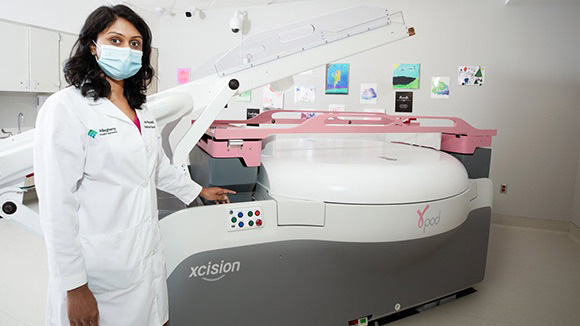
3D conformal radiation therapy
Physicians view a tumor in three dimensions and sculpt radiation beams to its shape, limiting radiation’s effects on healthy tissue.
Intensity-modulated radiation therapy
We visualize tumors in three dimensions and treat them with “beamlets” of light. This therapy allows physicians to target tumors in difficult positions, like near the spinal cord.
Side effects from radiation for breast cancer
What are the side effects of radiation for breast cancer? Common side effects for both internal and external radiation for breast cancer may include:
- Swelling of the breast.
- Pain in the breast.
- Infection.
- Hair loss in the armpit.
- Skin reactions, such as dryness, itchiness, blistering, or flakiness.
- Fatigue.
- Sore throat.
- Changes in your breast size, shape, or color.
Side effects typically last two to four weeks after breast cancer radiation therapy. In general, radiation treatment shouldn't limit your everyday life, and you can typically continue your day-to-day activities without interruption.
Side effects of partial breast radiation therapy
AHN physicians are among the first adopters of partial breast radiation therapy, which has a very low risk of side effects. Skin irritation and fatigue are the most common side effects, if any occur.
Side effects of other radiation therapies
Side effects from radiation for breast cancer range from:
- Most common: fatigue, skin irritation, breast swelling, and hair loss in the armpit.
- Less common: difficulty swallowing, lymphedema (swelling of the arms or legs), and breast pain.
- Very rare: cough, shortness of breath, changes in your breast shape, size, or color.
Integrative oncology and exercise oncology
The AHN Breast Cancer Center of Excellence offers integrative oncology to help patients manage symptoms and side effects from radiation for breast cancer. This includes support services, such as massage, acupuncture, and nutrition counseling. We encourage patients to take advantage of AHN’s Exercise Oncology and Resiliency Center at AHN Suburban – Bellevue. Physicians and certified strength and conditioning specialists provide a personalized training plan that can help decrease side effects and improve quality of life and physical function.
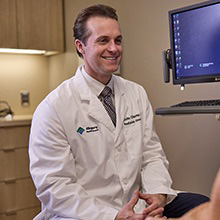
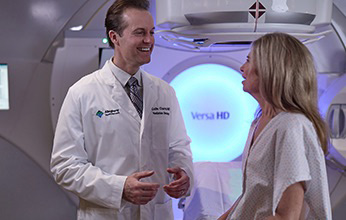
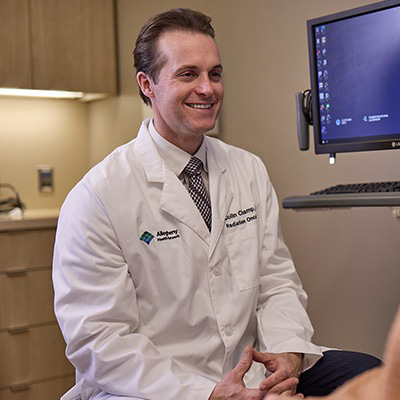

Support throughout your treatment
Once you’re diagnosed with breast cancer, your care team will be with you every step of the way. Your team may include oncologists, radiologists, surgeons, and other cancer specialists. They meet regularly to discuss your treatment and progress so that you benefit from a wide range of expertise.
We also offer a Navigation Program to help you and your loved ones manage the many stages of your care. Our patient navigation services provide you with a highly trained nurse navigator and other supportive care professionals, such as financial counselors, dietitians, and social workers, who can help support you throughout your journey.
Our breast cancer radiation therapy specialists
Radiation oncologists at AHN are board-certified and have specialized training to treat breast cancer. They practice at several locations.

Radiation Oncology

Radiation Oncology
Contact us
Call (412) 578-HOPE (412) 578-4673 to schedule an appointment at any location within the Allegheny Health Network Cancer Institute or connect with a nurse navigator.
Locations
Visit our location page to find a radiation oncology location near you.
Schedule a mammogram
Schedule your annual mammogram today: Book my mammogram.
What to expect
Your navigation team will explain different treatment options available for your type and stage of breast cancer. A nurse navigator will help answer any questions you or your family may have along the way.
Second opinions
If you have cancer, you have a team of oncology specialists who will review your medical records and offer you a second opinion. After completing their review, they’ll talk with you about your goals to determine a course of treatment that’s right for you. To get started, fill out our Second Opinion Request form. Our navigation team will contact you to discuss next steps.
GammaPod® is a registered trademark of Xcision Medical Systems and used with permission.

